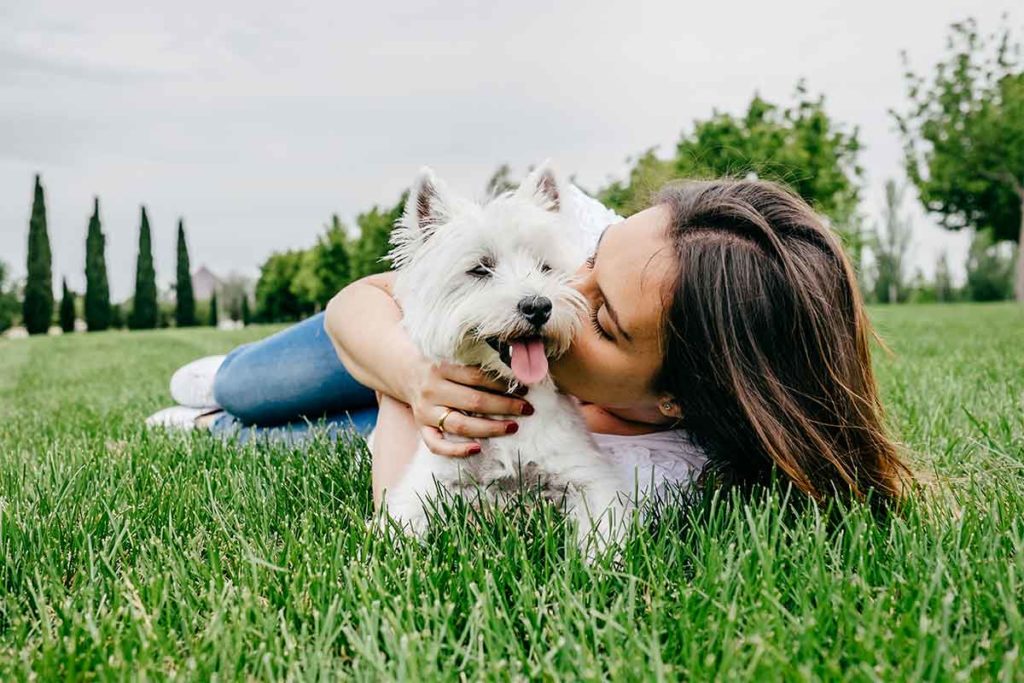How do I know my pet loves me? I get asked this question a lot!
I suppose first I need to address whether or not pets can love. They certainly do have emotional capacity, as Temple Grandin, Ph.D., pointed out in her book, “Animals in Translation.” Others have demonstrated the same regarding the similar brain neurochemistry that dogs and cats share with us. I’m unsure about pet snakes or pet goldfish, but certainly pet parrots and pet rats may demonstrate a devotion to their people. But is all this the same as love?
I recently asked Dr. Grandin this, and her response was short and sweet. “Yes, why not?”
I suppose that’s an interesting way to look at it. Instead of answering my question, she asks why do you think they don’t?
It’s not my opinion. We now know what’s in the neurochemical soup inside brains of many species. And that soup looks similar in cats and dogs and humans. But does neurochemistry really relate to how pets really feel?
Here’s one dictionary definition of love:
…profoundly tender demeanor, joy in presence of another, offering expressions of affection or adoration for another, dedicated and devoted.
I don’t know about you, but all this describes our dogs and our cat on a daily basis.
And do you really need to ask this question when you’ve been away for a few days and on your return your dog greets you with unparalleled abandon? Or as you read a book, your cat indicates, “No, it’s not about the printed page, it’s all about me.” And insists on walking all over you and the book until you give in and pet the cat, who’s now purring and drooling. And you just know that cat is telling you, “I love you.”
Is love limited to humans? I say no, and here’s why.
Love might best be described when one being is willing to risk his or her own life to save a loved one.
There are countless stories of dogs, and yes, cats too, doing just that, risking their own lives to save their human.
It wasn’t that long ago that scientists reserved any and all emotions for the human species. Today, we know better.
I believe that dogs especially may love us unconditionally, which sometimes isn’t to their benefit. Abuse a dog, and it’s possible that dog will keep coming back, continually giving love back, only to be abused again and again. Sometimes people will do the same. As for dogs, the explanation may be in their genes. Dogs co-evolved with the human species and are hard-wired to bond with us.
Is love all that a pet needs? Absolutely not.
There are some who believe that love solves behavior problems in dogs and cats. This especially comes up when rescuing animals. While loving a pet is certainly a good thing, love doesn’t solve all, though I wish it could.
For example, if your newly adopted dog is aggressive to strangers, love all by itself won’t solve the problem. In fact, it’s dangerous to continue living with an aggressive dog without seeking out appropriate professional help. And without treatment, most behavior problems only worsen over time, no matter how much love we apply. If the cat is tinkling outside the litter box, shower all the love you can on that cat, but if there is one litter box in a home with five cats, love isn’t all that cat needs; the answer is more litter boxes.
Having said that, some pets who require building trust again absolutely turn around in loving homes. But sometimes we can spoil pets with misplaced love or even too much love unbalanced by inappropriate care.
For instance, in most cultures love is associated with food. No wonder, then, that more than half of all dogs and cats in the U.S. are overweight or obese.
And though we may consider them to be family members, dogs are still dogs and cats are still cats. We can’t change that. Treating them like human children may come from a good place, but it is decidedly not beneficial. They do need appropriate outlets to express their natural behaviors, the things they were born to do. Providing those opportunities is something zoos have figured out how to do, but pet owners are just starting to understand that companion animals have the same needs.
Love is great start, but we can always learn more about meeting our pets’ needs, which is really the purpose of www.fearfreehappyhomes.com.
This article was reviewed/edited by board-certified veterinary behaviorist Dr. Kenneth Martin and/or veterinary technician specialist in behavior Debbie Martin, LVT.








